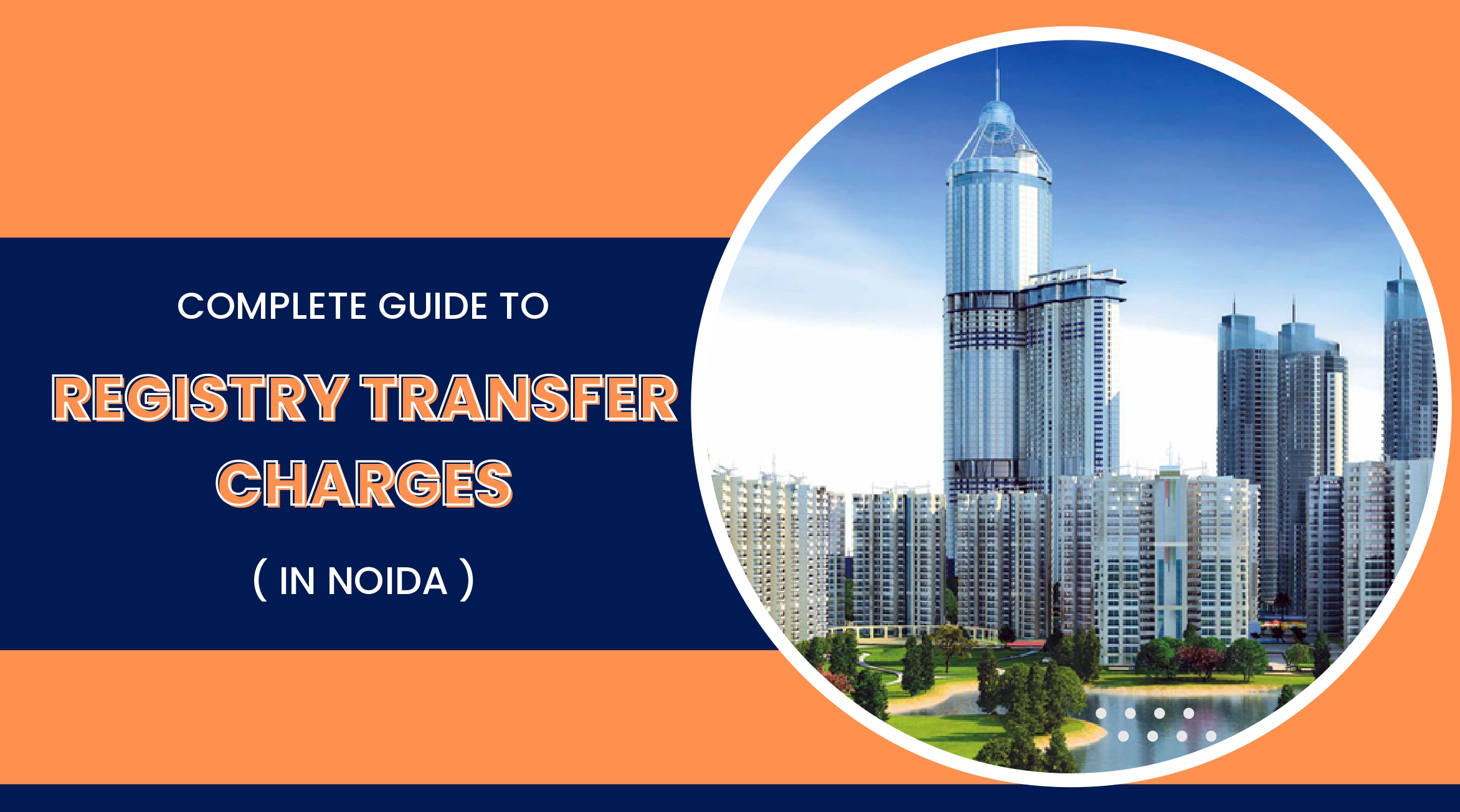Table of Contents
In India, property registration is a legal requirement that has to be fulfilled by any person who purchases or sells a property. Property registration refers to the process of recording a property sale transaction with the government. In Noida, the process of property registration involves the payment of various fees and charges, including the registry transfer charges. In this blog, we will provide a comprehensive guide to registry transfer charges in Noida.
What are Registry Transfer Charges?
Registry transfer charges are the fees that are levied by the Noida Development Authority (NDA) on the transfer of property ownership from one party to another. These charges are applicable when a property is sold or purchased, and the ownership of the property is transferred from the seller to the buyer. The registry transfer charges are payable by the buyer of the property and are calculated as a percentage of the property’s sale price.
Calculating Registry Transfer Charges in Noida
The registry transfer charges in Noida are calculated based on the property’s sale price, and the charges are determined by the Noida Development Authority. The charges are generally calculated as a percentage of the property’s sale price, and the rate varies depending on the location and type of property. The current rate of registry transfer charges in Noida is 1% of the property’s sale price.
For example, if a property is sold for Rs. 50 lakh, the registry transfer charges payable would be Rs. 50,000 (1% of Rs. 50 lakh). It is important to note that the registry transfer charges are payable in addition to the stamp duty, registration fees, and other charges that are applicable on the property transaction.
Payment of Registry Transfer Charges
The payment of registry transfer charges in Noida is the responsibility of the buyer of the property. The buyer is required to pay the charges within 30 days of the execution of the sale deed. The payment can be made in the form of a demand draft or a banker’s cheque, and the payment should be made in favor of the Noida Development Authority.
Documents Required for Payment of Registry Transfer Charges
To pay the registry transfer charges in Noida, the buyer of the property is required to submit the following documents:
- Copy of the sale deed
- Copy of the buyer’s PAN card
- Copy of the seller’s PAN card
- Copy of the property’s previous registry
- No Objection Certificate (NOC) from the Noida Development Authority (if applicable)
- Any other relevant documents as requested by the Noida Development Authority
It is important to ensure that all the documents are in order before making the payment of the registry transfer charges.
Conclusion
Registry transfer charges are an important aspect of property registration in Noida. The charges are payable by the buyer of the property and are calculated as a percentage of the property’s sale price. It is important to ensure that all the necessary documents are in order before making the payment of the registry transfer charges. By following the guidelines provided in this blog, buyers of property in Noida can ensure a smooth and hassle-free registration process.
Also Read: Difference Between Carpet Area, Built Up Area and Super Area
FAQs
1. What are registry transfer charges?
Registry transfer charges are the fees levied by the Noida Development Authority on the transfer of property ownership from one party to another.
2. Who pays the registry transfer charges?
The buyer of the property is responsible for paying the registry transfer charges.
3. How are registry transfer charges calculated?
Registry transfer charges are calculated as a percentage of the property’s sale price.
4. What is the current rate of registry transfer charges in Noida?
The current rate of registry transfer charges in Noida is 1% of the property’s sale price.
5. When are registry transfer charges payable?
Registry transfer charges are payable within 30 days of the execution of the sale deed.
6. What are the consequences of not paying registry transfer charges?
If the registry transfer charges are not paid, the property cannot be registered in the name of the buyer.
7. What is the mode of payment for registry transfer charges?
The payment of registry transfer charges can be made in the form of a demand draft or a banker’s cheque.
8. What documents are required for payment of registry transfer charges?
The buyer of the property is required to submit a copy of the sale deed, buyer’s PAN card, seller’s PAN card, property’s previous registry, NOC from the Noida Development Authority (if applicable), and any other relevant documents as requested by the Noida Development Authority.
9. Can registry transfer charges be paid in installments?
No, registry transfer charges cannot be paid in installments. The entire amount must be paid within 30 days of the execution of the sale deed.
10. Is stamp duty applicable in addition to registry transfer charges?
Yes, stamp duty is applicable in addition to registry transfer charges.
11. What is stamp duty?
Stamp duty is a tax levied by the government on property transactions.
12. How is stamp duty calculated?
Stamp duty is calculated as a percentage of the property’s sale price or its market value, whichever is higher.
13. Who is responsible for paying stamp duty?
The buyer of the property is responsible for paying stamp duty.
14. What is the penalty for late payment of stamp duty?
The penalty for late payment of stamp duty varies from state to state.
15. How long does the property registration process take?
The property registration process usually takes 2-3 weeks.
16. What is the role of the Noida Development Authority in the property registration process?
The Noida Development Authority is responsible for collecting registry transfer charges and stamp duty, and registering the property in the name of the buyer.
17. What is the process of property registration in Noida?
The process of property registration in Noida involves the payment of stamp duty, registration fees, and other charges, submission of documents, and verification by the sub-registrar.
18. What is an NOC?
An NOC is a No Objection Certificate issued by the Noida Development Authority. It certifies that the property is free from any legal disputes and that the Authority has no objection to the transfer of ownership.
19. What is the validity of an NOC?
The validity of an NOC is usually 3-6 months.
20. Is an NOC mandatory for property registration?
No, an NOC is not mandatory for property registration. However, it is recommended to obtain an NOC to avoid any legal disputes in the future.
21. What is a sale deed?
A sale deed is a legal document that records the sale and transfer of ownership of a property from the seller to the buyer.




